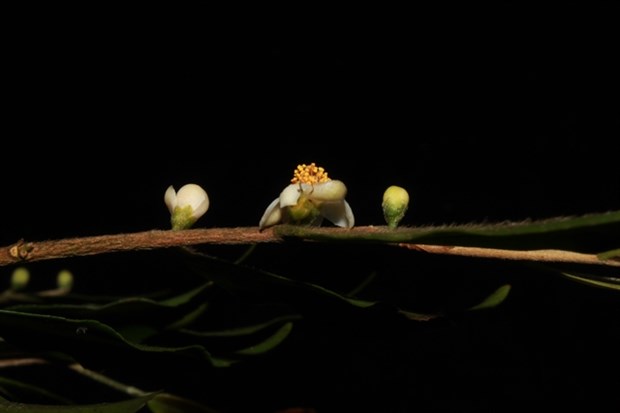New species of plants found in Lam Dong province
Four new species of camellia (a genus of flowering plants in the family Theaceae) and Begonia (a genus of perennial flowering plants in the family of Begoniaceae) – have been found in Bidoup-Nui Ba National Park in Lam Dong province by a group of Vietnamese and international scientists and researchers.
 Camellia Flosculora (Photo: Bidoup-Nui Ba National Park)
Camellia Flosculora (Photo: Bidoup-Nui Ba National Park) Lam Dong (VNS/VNA) - Four new species of camellia (a genus of
flowering plants in the family Theaceae) and Begonia (a genus of perennial
flowering plants in the family of Begoniaceae) – have been found in Bidoup-Nui
Ba National Park in Lam Dong province by a group of Vietnamese and
international scientists and researchers.
Dr Le Van Huong, director of the park, told Viet Nam News that reports of the new four plants – including two camellia species (Camellia Flosculora and Camellia bidoupensis) and two begonia species (begonia hongiaoensis and begonia lamdongiana) – have been recently published by Phytotaxa (a botany journal); Brittonia (a peer-reviewed botanical journal) and International Camellia Society.
Huong said the discoveries were thanks to the great efforts made by researchers and scientists during field surveys at the park.
He said the results once again prove the rich biodiversity of the park and the importance of international cooperation in research on finding new species.
The four new species were found at the park during field surveys by scientists from the Southern Institute of Ecology, the Da Lat University, the VNU University of Science, Dr Cecilia Koo Botanic Conservation Centre (KBCC), a non-governmental organisation for tropical plant conservation in Taiwan, and the park in the 2018-20 period.
Several new or newly recorded species were found in recent investigations in the park under the ‘Botanical survey in Lang Biang Plateau’, that helped increase the inventory of botanical diversity of Vietnam.
At least 90 begonia species were reported in Vietnam, and only three Begonia species had been found in Bidoup-Nui Ba National Park.
It is clear that this is an underestimation because over three begonias have been recorded based on field surveys. Due to the vast land area of the forest, more new begonias could be expected once more areas within the National Park are explored botanically, reports said.
The Bidoup-Nui Ba National Park, which covers roughly 70,000 hectares, 91 percent of which is primary forest, is rich in flora and fauna.
About 2,075 species of flora – one-sixth of Vietnam’s total – have been found here, while 301 bird species (30 per cent of all birds in the country) have also been spotted.
Huong said the newest camellia (Polyspora huongiana), discovered in 2012 by biologists from both Vietnam and the Royal Botanic Garden Australia, was named after him for his scientific contributions to conservation.
The park has been cooperating with the World Bank (WB), the Asia Development Bank (ADB), JICA, USAID, and the German International Cooperation Agency (GIZ) in different programmes focusing on the research and protection of flora and fauna and has supported sustainable livelihoods for ethnic groups./.
Dr Le Van Huong, director of the park, told Viet Nam News that reports of the new four plants – including two camellia species (Camellia Flosculora and Camellia bidoupensis) and two begonia species (begonia hongiaoensis and begonia lamdongiana) – have been recently published by Phytotaxa (a botany journal); Brittonia (a peer-reviewed botanical journal) and International Camellia Society.
Huong said the discoveries were thanks to the great efforts made by researchers and scientists during field surveys at the park.
He said the results once again prove the rich biodiversity of the park and the importance of international cooperation in research on finding new species.
The four new species were found at the park during field surveys by scientists from the Southern Institute of Ecology, the Da Lat University, the VNU University of Science, Dr Cecilia Koo Botanic Conservation Centre (KBCC), a non-governmental organisation for tropical plant conservation in Taiwan, and the park in the 2018-20 period.
Several new or newly recorded species were found in recent investigations in the park under the ‘Botanical survey in Lang Biang Plateau’, that helped increase the inventory of botanical diversity of Vietnam.
At least 90 begonia species were reported in Vietnam, and only three Begonia species had been found in Bidoup-Nui Ba National Park.
It is clear that this is an underestimation because over three begonias have been recorded based on field surveys. Due to the vast land area of the forest, more new begonias could be expected once more areas within the National Park are explored botanically, reports said.
The Bidoup-Nui Ba National Park, which covers roughly 70,000 hectares, 91 percent of which is primary forest, is rich in flora and fauna.
About 2,075 species of flora – one-sixth of Vietnam’s total – have been found here, while 301 bird species (30 per cent of all birds in the country) have also been spotted.
Huong said the newest camellia (Polyspora huongiana), discovered in 2012 by biologists from both Vietnam and the Royal Botanic Garden Australia, was named after him for his scientific contributions to conservation.
The park has been cooperating with the World Bank (WB), the Asia Development Bank (ADB), JICA, USAID, and the German International Cooperation Agency (GIZ) in different programmes focusing on the research and protection of flora and fauna and has supported sustainable livelihoods for ethnic groups./.













